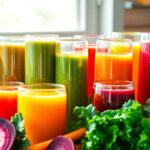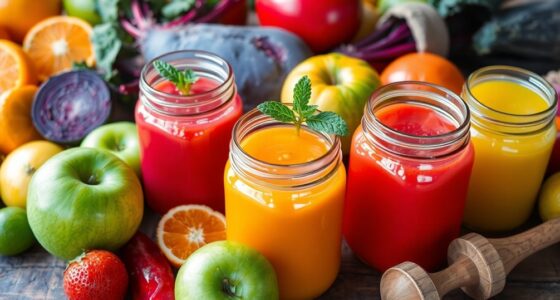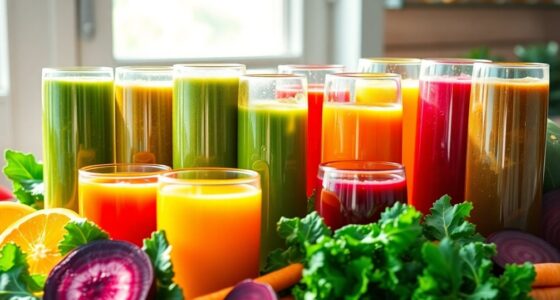When comparing organic and conventional juices, organic juices generally win out. They offer higher nutritional content, including more antioxidants and essential vitamins, which can boost your health. Plus, organic farming practices are better for the environment, reducing chemical pollution and supporting biodiversity. While they might cost more, the long-term health benefits can make that investment worthwhile. Curious to learn about specific taste differences and consumer trends? There's more to explore on this topic!
Key Takeaways
- Organic juices contain 20-40% more antioxidants than conventional juices, promoting heart health and reducing cancer risks.
- The absence of synthetic pesticides in organic juices results in lower chemical exposure and safer options for those with sensitivities.
- Organic farming practices improve soil health and biodiversity, making organic juices a more sustainable choice for the environment.
- While organic juices are typically 134% more expensive, their long-term health benefits often justify the higher cost for consumers.
- Taste and flavor profile of organic juices are enhanced by higher nutrient retention and the use of ripe, pesticide-free fruits and vegetables.
Nutritional Content Comparison
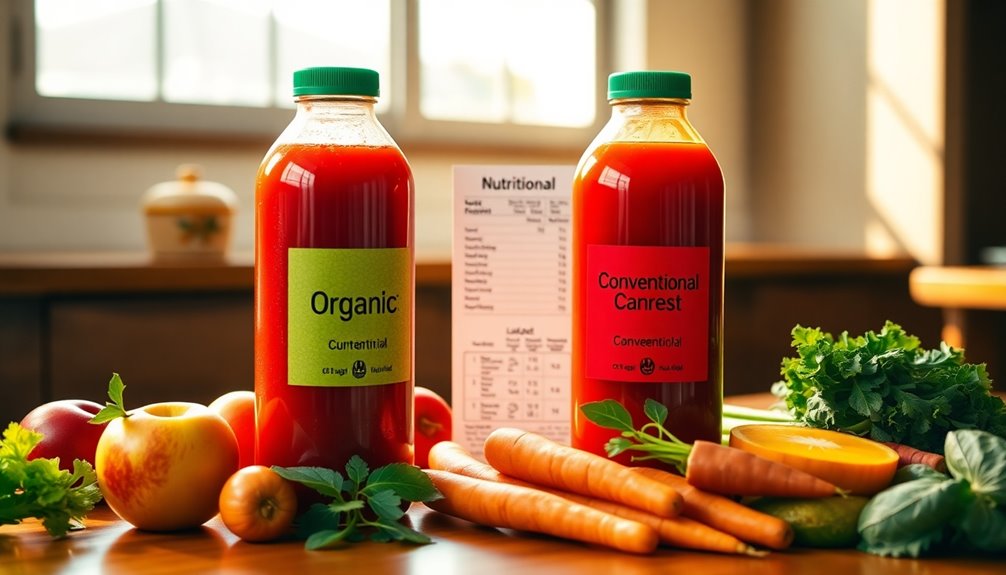
When you compare the nutritional content of organic and conventional juices, you'll often find that organic options stand out due to their richer vitamin and mineral profiles.
Organic juices usually boast higher levels of essential vitamins and minerals, thanks to nutrient-rich soils used in organic farming. They also contain more antioxidants, contributing to their health benefits. Additionally, organic juices have a higher soluble solids content, which enhances their sweetness and flavor. This increased antioxidant level may aid in detoxification and reducing inflammation.
Cold-pressed organic juices retain more nutrients due to minimal processing, while conventional juices might lose nutritional value due to pasteurization.
Plus, organic juices have lower pesticide residues, making them a safer choice for those concerned about chemical exposure.
With organic options, you're likely to enjoy higher levels of polyphenols and ascorbic acid, enhancing their overall nutritional appeal.
Environmental Impact Analysis
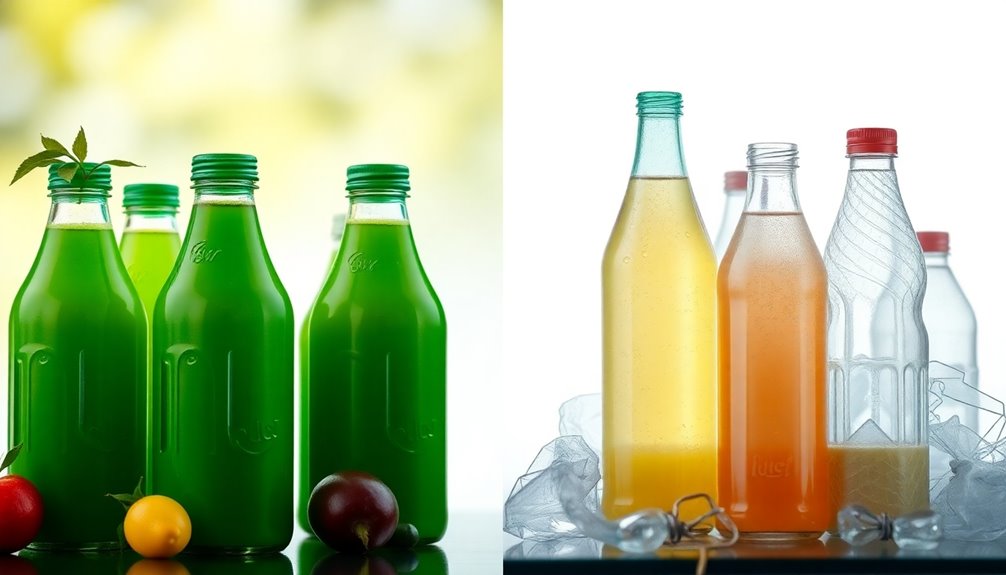
The nutritional benefits of organic juices extend beyond personal health; they also play a significant role in promoting environmental sustainability.
By choosing organic, you support sustainable farming practices that enhance soil health and protect biodiversity. Organic farming avoids synthetic pesticides and fertilizers, reducing chemical pollution and minimizing water contamination. This approach leads to lower environmental impact compared to conventional farming. Additionally, eco-friendly practices in organic farming contribute to the preservation of natural resources and ecosystems.
You'll also appreciate that organic methods prioritize efficient water use, conserving this vital resource. Additionally, these practices help prevent soil erosion and safeguard local ecosystems and wildlife.
In contrast, conventional farming often leads to soil degradation and biodiversity loss due to harmful chemicals.
Health Benefits Overview
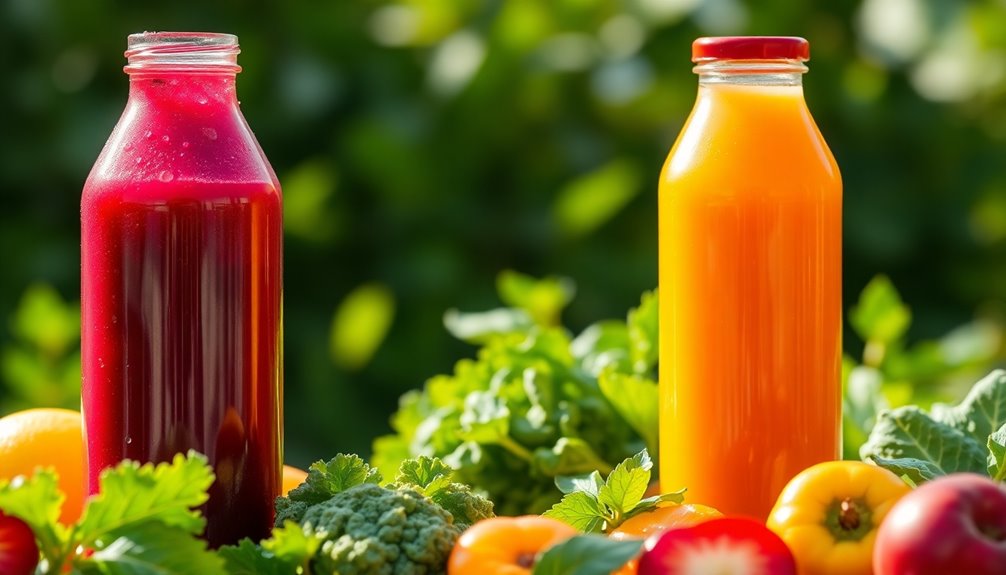
Choosing organic juices not only enhances your health but also supports a cleaner lifestyle.
Organic juices offer 20-40% more antioxidants than their conventional counterparts, helping to combat aging and neutralize free radicals. These antioxidants protect your cells and may lower the risk of heart disease and cancer while boosting your immune function. Additionally, organic juices are rich in nutrient density, which contributes to their superior health benefits. Studies show that daily cranberry juice consumption may further enhance overall health, particularly when considering its antioxidant-rich profile.
You'll also find that organic juices are richer in vitamins and minerals, thanks to the absence of synthetic pesticides and fertilizers. With their fresher taste and higher nutrient density, they support better gut health.
Plus, by minimizing chemical exposure, organic juices are safer for those with allergies and sensitivities, making them a smart choice for your overall well-being.
Cost Considerations
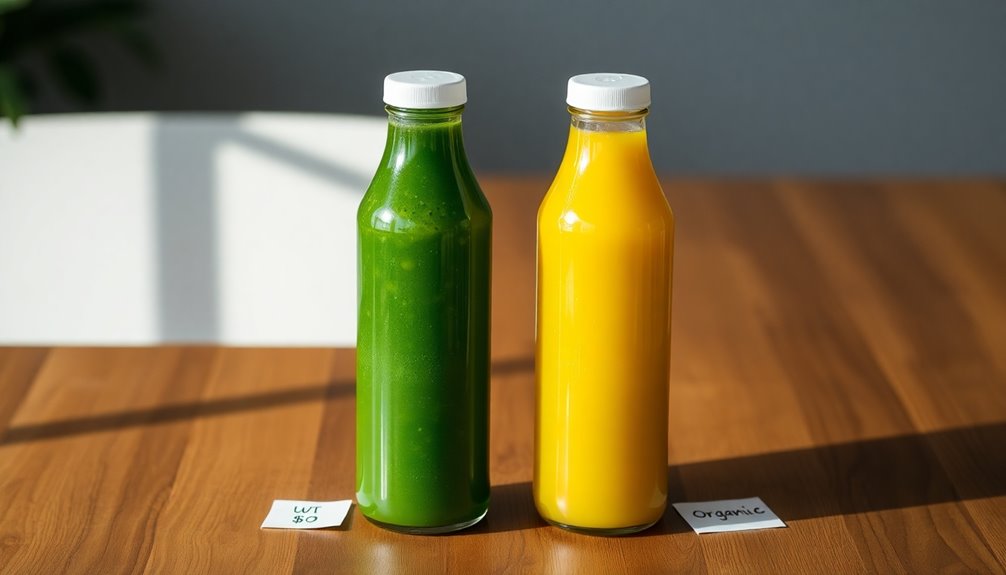
While organic juices offer numerous health benefits, their higher price tags can make you think twice. Typically, organic juices cost significantly more than conventional ones—sometimes up to 134% extra. This price difference reflects the labor-intensive farming practices and sustainable methods used in organic production. Quality standards in organic farming often lead to better nutritional profiles, which can contribute to your overall health. Additionally, organic juices are often richer in antioxidants and vitamins that support immune function and overall wellness.
If you're budget-conscious, conventional juices might seem more appealing, but you could miss out on long-term health advantages. Interestingly, as the demand for organic products increases, prices may become more competitive.
To save, consider loyalty programs or shopping during sales. Ultimately, weighing the cost against potential health and environmental benefits can guide your purchasing decisions, making it easier to choose what aligns with your values and budget.
Taste and Quality Assessment
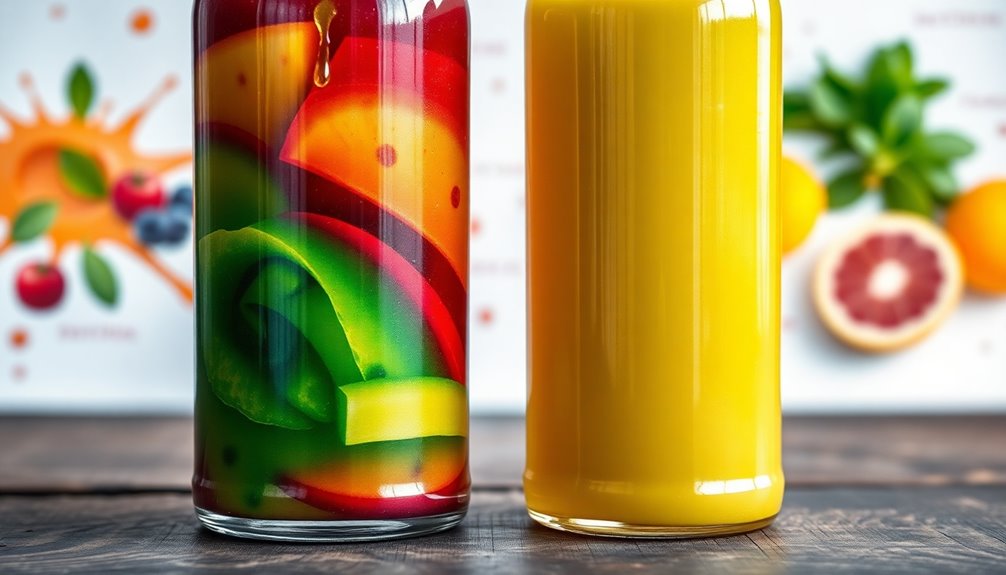
Many people believe that organic juices offer a superior taste and quality compared to conventional options. Many consumers perceive organic juices as more flavorful, partly due to the presence of organic acids and the farming practices that enhance nutrient retention. For instance, organic orange juice often scores higher in taste tests compared to its conventional counterpart. However, individual preferences and factors like ripeness can affect your experience. While organic juices generally boast higher nutrient levels and fewer chemical residues, the taste can also be influenced by psychological factors, leading you to associate organic with health and flavor. Additionally, organic juices are often made from fruits and vegetables that are grown without pesticides, which can further contribute to their appealing flavor profile. Ultimately, your choice may hinge on personal values, health priorities, and the specific juice variety you’re considering. Additionally, organic juices often retain higher levels of essential vitamins due to cold-pressed juicing methods, further enhancing their appeal. Moreover, sugarfree organic natural juices have gained popularity among health-conscious consumers, as they offer a guilt-free option without compromising on taste or nutrients. These juices are made by using ripe, organic fruits that are naturally low in sugar, allowing enthusiasts to enjoy the full flavor profile without added sweeteners. As more people become aware of the benefits of organic products, the demand for sugarfree organic natural juices is likely to continue to rise, reflecting a growing commitment to healthier lifestyle choices.
Certification and Regulation Insights
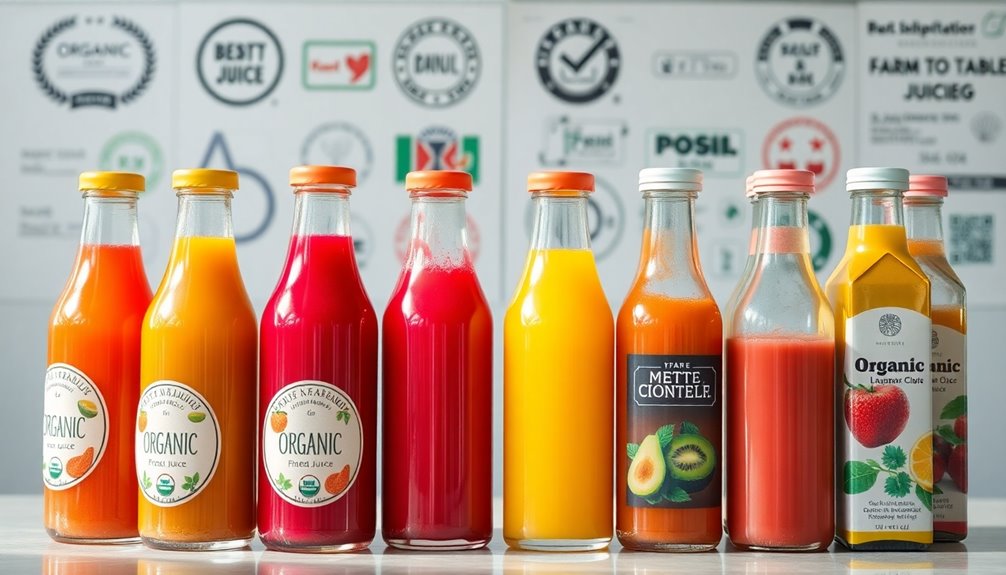
Understanding the certification and regulation of organic juices is key to making informed choices about what you're consuming. The USDA provides organic certification to ensure compliance with strict standards focused on ecological balance and biodiversity.
To gain this certification, farms must create an Organic System Plan and undergo a three-year transition period if moving from conventional farming. Products labeled as "USDA Organic" must contain at least 95% organic ingredients, while "Made With" labels require at least 70%. Compliance with organic standards is overseen by USDA-accredited agents through annual audits. Additionally, organic products must avoid synthetic pesticides, genetic engineering, and artificial additives, ensuring they meet rigorous safety regulations. Understanding these regulations helps you trust the organic juices you choose. Furthermore, the certification requirements for organic flavors are strictly enforced to maintain the integrity of organic products.
Consumer Preferences and Trends

As consumers become increasingly health-conscious and environmentally aware, preferences for organic juices are on the rise.
You likely view organic options as safer and more nutritious, with many believing they offer a positive environmental impact. About 75% of you prioritize food safety and nutrition when choosing organic products, while 40% perceive them as superior to conventional juices. Keyword Research shows that concerns about chemical residues drive you towards organic choices, as you value health benefits and sustainability over factors like flavor. Additionally, the growth in the organic tea market reflects a broader trend towards sustainable and health-focused products.
While organic juices often come with a higher price tag, younger consumers, particularly those with service or white-collar jobs, are leading the trend.
Ultimately, your commitment to health and the environment shapes your juice preferences significantly.
Long-Term Health Implications
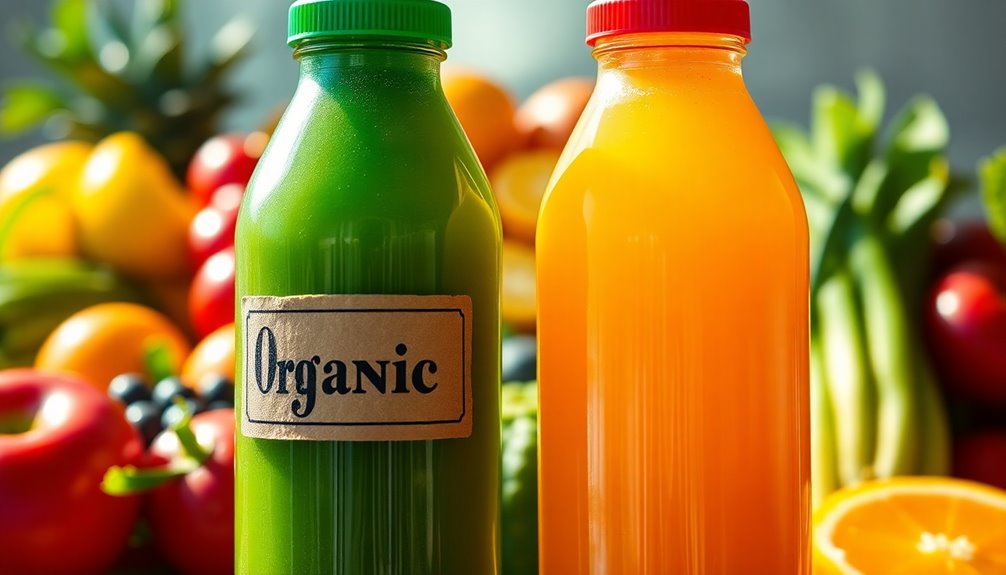
Your growing preference for organic juices reflects a deeper concern for long-term health implications. Choosing organic means you're opting for juices rich in antioxidants, which can help prevent diseases like heart disease and cancer. Additionally, exotic fruit blends can enhance the flavor and nutritional profile of your juices.
With higher nutrient content, organic options typically offer more vitamins and minerals than conventional juices, enhancing your overall health. Additionally, organic juices are free from synthetic pesticides and fertilizers, reducing your chemical exposure—a crucial factor for long-term wellness.
By avoiding additives found in conventional juices, you're also supporting gut health and detoxification. Plus, organic farming practices promote environmental sustainability, ensuring a healthier planet for future generations. Studies have shown that some organic foods have less pesticide residue, further supporting your choice for organic juices.
In essence, your choice of organic juices is a proactive step towards safeguarding your health and the environment.
Frequently Asked Questions
How Do Storage Methods Affect Juice Quality and Freshness?
Storage methods significantly impact juice quality and freshness. You should always opt for glass or stainless steel containers, as they prevent chemical leaching.
Keeping your juice at 35-40°F in the fridge slows nutrient loss. If you're storing it long-term, freeze in small portions.
Remember to use airtight lids to minimize oxygen exposure. Proper storage techniques can extend your juice's shelf life and maintain its delicious taste and beneficial nutrients.
Are There Specific Brands Known for High-Quality Organic Juices?
When you're looking for high-quality organic juices, several brands stand out.
Lakewood Organic has been a trusted name for over 80 years, while Santa Cruz Organic offers various flavorful options.
R.W. Knudsen focuses on sustainably sourced ingredients, and Garden of Flavor emphasizes transparency in sourcing.
Uncle Matt's Organic specializes in 100% organically grown fruit juices.
Each brand prioritizes quality, so you can feel good about your juice choices!
Can I Make Juice at Home for Better Quality?
Making juice at home is like crafting a personal masterpiece; you control every ingredient.
You'll enjoy better quality juice packed with nutrients, active enzymes, and no unwanted additives.
Plus, you can customize flavors to suit your taste and dietary needs.
By skipping store-bought options, you avoid pasteurization and plastic waste, ensuring your juice is fresh and environmentally friendly.
What Are the Best Fruits and Vegetables for Juicing?
When you're juicing, some of the best fruits include apples, grapes, and pineapples for their sweetness and flavor.
For vegetables, kale, carrots, and beets stand out due to their nutritional benefits and taste.
You can mix fruits and veggies for exciting combinations, like apple and carrot or kale and pineapple.
Experimenting with these ingredients will help you create delicious, nutrient-packed juices that suit your palate perfectly.
Enjoy your juicing journey!
How Do Juice Blends Compare Between Organic and Conventional Options?
When you compare juice blends, you'll find organic options often shine with richer nutrient profiles, while conventional blends might be easier on your wallet.
Organic juices tend to boast higher antioxidants and fewer pesticides, enhancing health benefits.
However, conventional juices offer convenience and availability.
So, if you're prioritizing nutrition and taste, organic might be your best bet.
But if you need something quick and affordable, conventional blends can still satisfy your cravings.
Conclusion
In the battle of organic versus conventional juices, the winner really depends on your priorities. If you're after nutritional superiority and environmental consciousness, organic may be your champion. However, if cost and availability matter more, conventional juices might quench your thirst. Ultimately, each choice has its merits, like two sides of the same coin. So, weigh the factors that matter most to you, and sip your juice with confidence, knowing you've made an informed decision.
Cindy thoroughly researches juicing trends, techniques, and recipes to provide readers with practical advice and inspiration. Her writing style is accessible, engaging, and designed to make complex concepts easy to understand. Cindy’s dedication to promoting the advantages of juicing shines through her work, empowering readers to make positive changes in their lives through the simple act of juicing.








